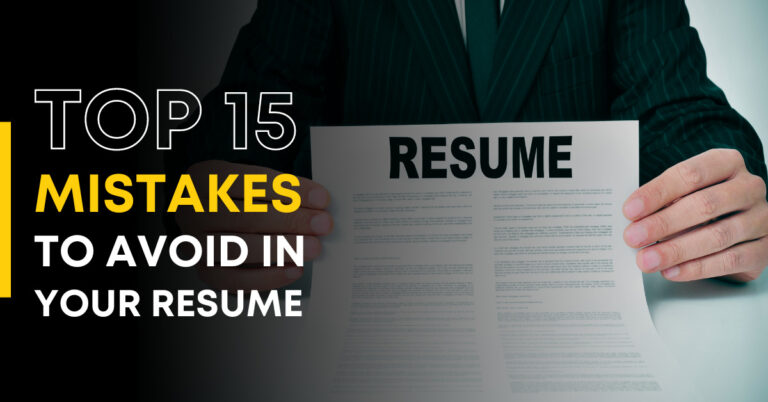You tend to make mistakes in your resume and eventually lead to job rejection or lower-package. In this blog, we will be covering the 15 most common mistakes that people make in their resume.
1. Making Typographical Error and Mistakes
You need to go through your resume multiple times to avoid any typographical errors and mistakes as the resume is your first impression. You can always use any 3rd party tools such as Grammarly to write effectively.
2. Giving a lot about personal information
You need to understand that a resume is your professional portfolio and writing a lot of personal information in it makes it unnecessarily long. Make it simple to read and understand.
3. Writing about employment gaps
Employment gaps are often a risky thing to have. It can lead to many negative points and can become a main factor for your rejection. We recommend not to mention them in your resume and only talk about it, when the interviewer asks about it. Or use them as a way that the employment gaps can showcase your skills. For eg. You can say that you have an employment gap because you are learning new skills that will be beneficial to the job effectively.
4. Mentioning unprofessional email address
In the corporate world, email addresses are considered as the primary way to communicate. Making an unprofessional resume like “[email protected]” will hamper your communication with your seniors and colleagues. When we use these kinds of funky email ids, interviewers tend to think that the person is either not serious about the job or he is not sincere or committed enough towards the organisation.
5. Too much emphasizing upon your weaknesses
Primarily, you need not to mention your weaknesses in your resume but if interviewer talks about it, then you can discuss it in such a way that it can signify your qualities.
For eg, If you say ,“I spend a lot of time on netflix” it may sound bad but instead you can say ,“I spend some time on netflix because it acts like a stress buster to me and handling stress is one of the qualities that i have developed over a time”.
6. More lengthy resume means more stronger profile
Length of the resume is always a controversial topic amongst the job seekers.Every individual must have 2 resumes, “One-Pager Resume” which has your short and concise professional profile and the other one is your “Descriptive Resume” that can vary from 2-4 pages.
7. Cross check your contact information
You have to be conscious about writing your contact details in your resume. Use the primary phone number and email address in your resume.
Do not forget to update your contact details in your resume everytime you change your email or phone number.
8. Using Passive Language for Resume Content
You must not use passive language in your resume as it often results in a lengthy resume with a third party reference to it. It becomes a major reason to annoy any reader or interviewer. Always use active language with a first person perspective.
9. Low Quality & Unprofessional Picture
You should use high quality professional pictures in your resume, otherwise it can spoil your first impression. You cannot use any informal pictures like your selfies in your resume. Pictures that you use in your resume should be formal and professional.
Most commonly a photo in formal apparels are used in the resume to display professionalism.
10. Including Salary Requirements
Showcasing your salary requirements is often a bad idea while writing a resume but it can be possible that your salary requirement will not reciprocate the company’s norms or not as per your skillset.
11. Overly Used Vocabulary or Jargon
Overusing Vocabulary will signify your overconfidence which can be the worst thing you can do in your resume. Keep your resume simple and easy to read by any reader or interviewer.
12. Having an outdated resume
This is very crucial for any job seeker to update their resume timely with the new skills you’ve learnt and new milestones you achieved. Having an outdated CV simply implies that you are shadowing your potential.
13. Distracting formatting
Interviewer takes only 5 seconds to scan your CV to approve or disapprove it and having a distracting formatting in your resume can be a big red flag for them. Try to avoid unnecessary designs and try to keep your CV simple and clean.
14. Not tailoring your resume to match the job description
Your Resume should be altered according to the job you are applying for. This is the simplest technique to increase your chances of selection.
15. Unrelated work experience
Writing experiences from the job that are not in your segment is often neglected by the interviewer. The best technique can be to utilise that space to showcase your skills and knowledge that eventually increases the chances of selection.




